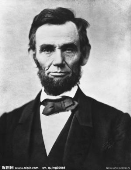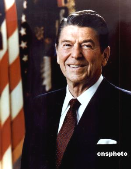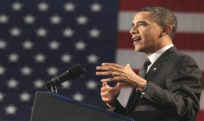-
When Abraham Lincoln was young, he worked in a store. One day a woman came into the store and bought some things. They added up to two dollars and six and a quarter cents.
The bill was paid, and the woman was entirely satisfied. But the young storekeeper, not feeling
quite sure as to the accuracy of his calculations, added up the things again. To his surprise he found that it should have been but two dollars.
“ I’ve made her pay six and a quarter cents more, ”said Abe, disturbed.
It was an unimportant thing, and many clerks would have forgotten it, but Abe was too conscientious for that.
“ The money must be paid back, ”he decided.
At night, he closed the store, and walked to the home of his customer. He explained the matter, paid over the six and a quarter cents, and returned satisfied.
Here is another story of young Lincoln’s strict honesty. A woman entered the store and asked for half a pound of tea. The young clerk weighed it out. This was the last sale of the day.
The next morning, when beginning his duties, Abe discovered a four-ounce weight on the scales. It flashed upon him at once that he had used this in the sale of the previous night, and so, of course, given his customers short weight. I am afraid that there are many country merchants who would not have been much worried by this discovery. But Abe weighed out the balance of the half pound, shut up the store, and carried it to the defrauded customer. I think my young readers will begin to see that the name so often given, in later times to President Lincoln, of “Honest Old Abe, ”was well deserved. A man who begins by strict honesty in his youth is not likely to change as he grows older, and mercantile honesty is some guarantee of political honesty.
1.We know from the text that Abe .
A. charged less for the woman
B. tricked the woman on purpose
C. was careful and responsible
D. was confident of his calculations
2.From the underlined sentence, we can see that the author .
A. speak highly of Abraham Lincoln
B. learns how to succeed in the political field
C. comes to understand the importance of honesty
D. hopes to give readers some personal suggestions
3.What does the author mainly intend to tell us?
A. Better late than never.
B. Honesty is the best policy.
C. A good name is better than gold.
D. Where there is a will there is a way.
4.The author develops his idea mainly .
A. by reasoning B. by making comparisons
C. by giving examples D. by recalling what he had seen
高三英语阅读理解中等难度题查看答案及解析
-
Is this the house_______Abraham Lincoln was born?
A.at where
B.which
C.in which
D.when
高三英语单项填空简单题查看答案及解析
-
Barack Obama has never been shy about comparing himself with Abraham Lincoln. He did so when he announced his presidential election in Illinois, where both he and Lincoln served in the legislature (立法机关). "The life of a tall, thin, self-made Springfield lawyer tells us that a different future is possible." Obama said. "He tells us that there is power in words and that there is power in hope." Such comparisons have continued on big and small occasions, but the most important similarity, in Obama's mind, is how he plans to govern if elected.
Obama says he admires Doris Kearns Goodwin’s wonderful Lincoln biography, Team of Rivals. "He talks about it all the time." says a top assistant. "He is particularly interested in the idea that Lincoln successfully won the hearts of many people who had run against him for President, some of them even disagree with him firmly." "The lesson is that you shouldn't let your hatred get in the way of hiring absolutely the best people." says Obama. "I think American people are practical and so I have an interest in casting a wide net, seeking out people with a wide range of expert knowledge, including Republicans, for the highest positions in the government."
"I don't want to have people who just agree with me." He says. "I want people who are continually pushing me forward and I'd be very interested in having those sorts of Republicans in my government, especially people who can speed up a responsible and logical conclusion to the Iraq war."
1.According to Barack Obama, the biggest similarity between Lincoln and himself is ______.
A. they both lived Illinois B. they served in the same office
C. both of them are black D. they have the same idea in governing
2.Obama is willing to cooperate with those who disagree with him because_______.
A. he is interested in Republicans' ideas
B. he doesn't want to show his hatred to the public
C. they have the highest positions in the government
D. they may push him to make the right decisions
3.The author wrote the passage to _________.
A. compare Obama and Lincoln
B. help Obama to win more support
C. tell us something about Obama
D. announce Obama's political ideas
4.What can we infer from the passage?
A. Obama is a member of the Republicans.
B. The passage was written after the presidential election.
C. Doris Goodwin is one of Obama’s assistants.
D. In the end Lincoln was able to get the support of the people who once hated him.
高三英语阅读理解中等难度题查看答案及解析
-
Barack Obama has never been shy about comparing himself with Abraham Lincoln. He did so when he announced his presidential election in lllinois ,where both he and Lincoln served in the legislature (立法机关) . “The life of a tall ,thin ,self –made Springfield lawyer tells us that a different future is possible.” Obama said. “He tells us that there is power in words and that there is power in hope.” Such comparisons have contiuned on big and small occasions,but the most important similarity ,in Obama’s mind, is how he plans to govern if elected.
Obama says he admires Doris Kearns Goodwin’s wonderful Lincoln biography, Team of Rivals.”He talks about it all the time .” says a top assistant .”He is particularly interested in the idea that Lincoln successfully won the hearts of many people who had run against him for President,some of them even disagree with him firmly .” “The lesson is that you shouldn’t let your hatred get in the way of hiring absolutely the best people .” says Obama.”I think American people are practical and so I have an interest in casting a wide net , seeking out people with a wide range of expert knowledge,including Republicans, for the highest positions in the government.”
“I don’t want to have people who just agree with me .”He says . “I want people who are continually pushing me forward and I’d be very interested in having those sorts of Republicans in my government, especially people who can speed up a responsible and logocal conclusion to the Iraq war..”
1.According to Barack Obama, the biggest similarity between Lincoln and himself is ______.
A.they both lived lllinois
B.they served in the same office
C.both of them are black
D.they have the same idea in governing
2.Obama is willing to cooperate with those who disagree with him because .
A.he is interested in Republicans’ideas
B.he doesn’t want to show his hatred to the public
C.they have the highest positions in the government
D.they may push him to make the right decisions
3. The author wrote the passage to .
A.compare Obama and Lincoln
B.help Obama to win more support
C.tell us something about Obama
D.announce Obama’s political ideas
4.What can we infer from the passage?
A.Obama is a member of the Republicans.
B.The passage was written after the presidential election.
C.Doris Goodwin is one of Obama’s assistants.
D.In the end Lincoln was able to get the support of the people who once hated him.
高三英语阅读理解简单题查看答案及解析
-
Today we think of Abraham Lincoln as a great leader. What most of us don’t know is that he was a well-known humorist and storyteller in his day.
Lincoln learned to tell jokes and stories from his father. When Lincoln became a lawyer, he used his jokes and stories to gain the good will of the jury (陪审团), and more than once his opposing lawyer would complain to the judge that Lincoln’s stories were irrelevant and distracting (转移、分心) to the jury. The trouble for them was that Judge David Davis loved Lincoln’s jokes more than anyone else in the court room.
As a politician, Lincoln made excellent use of his humorous stories. His long time political opponent Stephen A. Douglas complained that “Nothing else — not any of his arguments or any of his replies to my questions — disturbs me. But when he begins to tell a story, I feel that I am to be overmatched.” More than once Douglas and other political opponents of Lincoln’s saw their well presented arguments forgotten by the audience after Lincoln followed up their speeches with a homely story.
As the responsibilities of the office of President became greater and heavier, Lincoln used humor to find relief. He wanted to reduce the stresses in himself and those around him. One of Lincoln’s neighbors told that one day, he saw Lincoln walking past with two young shouting boys. “What’s the matter, Mr. Lincoln?” the neighbor asked. “The same thing that’s the matter with the whole world,” Lincoln answered. “I have three walnuts, and each one of them wants two of them.”
One cannot truly appreciate Lincoln without understanding his humorous side. He used his jokes and stories both for the purpose of winning over his audience and relieving the pressure he experienced as President during the terrible Civil War.
1.When Lincoln was a lawyer, what was his purpose of telling jokes and stories?
A. He wanted to satisfy the judge’s desire for jokes.
B. He wanted to distract his opposing lawyer.
C. He wanted to relieve his pressure.
D. He wanted to impress the jury.
2.What might be Douglas’ attitude towards Lincoln’s humorous stories?
A. Appreciative. B. Annoyed.
C. Concerned. D. Surprised.
3.What’s the purpose of the text?
A. To educate. B. To inform.
C. To persuade. D. To entertain.
高三英语阅读理解中等难度题查看答案及解析
-
President Abraham Lincoln’s first call for volunteers to fight in the Civil War was for whites only.The Civil War was a white man’s war,northern whites insisted.Its purpose was to preserve the Union.It was not being fought to end slavery.But by September of 1862,the sentiment toward black volunteers had changed.Lincoln had hoped that the war would be short,but it had already lasted for a year and a half.Union manpower had fallen dangerously.
Lincoln had a plan.He issued the Emancipation Proclamation.It stated that as of January 1,1863,all slaves living in the rebellious southern states would be forever free.And starting immediately,Union armies would accept black volunteers.
The southern rebels’response to Lincoln’s call for black troops was a deadly one.Captives (俘虏) of any Union regiment (团) with black troops were to be given “no quarter”.They were to be put to death immediately.
AfricanAmerican troops throughout the war distinguished themselves (表现突出) in battle at places like Milliken’s Bend,Fort Wagner,and the Crater at St.Petersburg.As to their conduct on the battlefield,Colonel Thomas Wentworth Higginson wrote,“Nobody knows anything about these men who has not seen them in battle.No officer in this regiment now doubts that the successful process of the war lies in the unlimited employment of black troops.” By the war’s end,186,000 black men had participated.They made up nearly 10 percent of Union forces.These black soldiers saw action in more than 250 battles.Black soldiers also gave their lives.By the war’s end,about 38,000 black soldiers had died.They died from disease,in battle,and after capture by rebel troops.
1. This passage is mainly about________.
A.cause of the Civil War
B.the Emancipation Proclamation
C.black soldiers in the Civil War
D.why Lincoln was a good president
2. What does the underlined word “sentiment” in the first paragraph mean?
A.Whites.
B.People who keep watch.
C.Rebels.
D.Thought and feeling.
3.What can we conclude from the passage?
A.Lincoln acted too late to free the slaves.
B.Blacks fought well for the Union cause.
C.The Civil War changed American history.
D.The southern rebels nearly won the Civil War.
4. Which of the following is TRUE according to the passage?
A.The Civil War’s purpose was to drive the black away.
B.The Civil War ended just in one year with the help of the blacks.
C.All slaves were set free by September of 1862.
D.Black captives of any Union regiment were killed after Lincoln’s call.
高三英语阅读理解中等难度题查看答案及解析
-

Abraham Lincoln, a self-taught lawyer, was elected 16th president of the United States in November 1860, shortly before the outbreak of the Civil War. Lincoln proved to be a smart military strategist and a competent leader: His Emancipation Proclamation(解放宣言) paved the way for slavery’s abolition, while his Gettysburg Address stands as one of the most famous speeches in American history. In April 1865, with the Union on the brink of victory, Abraham Lincoln was killed; his untimely death made him a hero to the cause of liberty, and he is widely regarded as one of the greatest presidents in U.S. history.

On January 20, 1981, Reagan took office. Only 69 days later he was shot by a would-be killer, but quickly recovered and returned to duty. His grace and wit during the dangerous incident caused his popularity to soar.
At the end of his two terms in office, Ronald Reagan viewed with satisfaction the achievements of his innovative program known as the Reagan Revolution, which aimed to motivate the American people and reduce their reliance upon Government. He felt he had fulfilled his campaign pledge of 1980 to restore “the great, confident roar of American progress and growth and optimism.”

When George W. Bush, at the age of 54, became the 43rd president of the United States, it was only the second time in American history that a president’s son went on to the White House. John Quincy Adams, elected the sixth president in 1824, was the son of John Adams, the second president. While John Adams had brought up his son to be president, George Bush, the 41st president, insisted he was surprised when the eldest of his six children became interested in politics, became governor of Texas, and then went on to the White House.

Barack Obama served as the 44th President of the United States. His story is the American story — values from the heartland, a middle-class upbringing in a strong family, hard work and education as the means of getting ahead, and the belief that a life so blessed should be lived in service to others.
With a father from Kenya and a mother from Kansas, President Obama was born in Hawaii on August 4, 1961. He was raised with help from his grandfather, who served in Patton’s army, and his grandmother, who worked her way up from the secretarial pool to middle management at a bank.
1.Of the four presidents, who is regarded as an excellent public speaker?
A. Abraham Lincoln.
B. Ronald Reagan.
C. George W. Bush.
D. Barack Obama.
2.When Donald Reagan left the White House, he felt that .
A. he regretted having been elected President
B. he still had much to do for the country
C. he had kept his promise to the people
D. he was becoming more popular with the people
3.Which of the following presidents took office first?
A. George W. Bush.
B. John Adams.
C. John Quincy Adams.
D. George Bush.
4.Of the four presidents, who successfully realized his American Dream?
A. Abraham Lincoln.
B. Ronald Reagan.
C. George W. Bush.
D. Barack Obama.
高三英语阅读理解中等难度题查看答案及解析
-
272. Because of the role he played in freeing the African-American from slavery, Abraham Lincoln is ______ as one of the _______ of all American presidents .
A.thought … great
B.thought … greatest
C.regarded … great
D.regarded … greatest
高三英语单项填空简单题查看答案及解析
-
When I was young, I belonged to a club that did community service work. There was one specific 36 that was unusual for me. I spent three or four hours handing out warm dinner to the homeless 37 in the streets. After that I went to a homeless shelter not far from the Bay Bridge.
I was in high school and at the time my sister was too young to 38 . She wanted to help, 39 she made many chocolate chip cookies for me to 40 and hand out to people. When getting to the shelter, I passed out the 41 . I began making sandwiches and 42 them with the crowd. I had the containers with my sister’s 43 in them and began to 44 around, offering them to anyone near me.
I approached an 45 gentleman and said, “ Sir, would you like a cookie?” He stopped and turned around, looked at me and said, “What did you say? Did you call me sir?” I told him I had, and his eyes 46 a little bit and said, “ No one has 47 called me sir.’ So he was completely moved.
It 48 me.
I explained I had been raised that 49 color and social status, everyone deserved respect. It 50 me to think that just because he was homeless, no one 51 him the honor. It broke my heart. I just didn’t understand 52 no one ever called him sir. I had never thought that anyone was below me because I wasn’t raised that way. Every 53 person deserves to be treated with respect. Years later, I still carry that memory and the 54 it taught me. Sometimes, what we take for granted can 55 make a difference in someone’s life.
1.A. case B. chance C. event D. accident
2.A. out B. far C. away D. off
3.A. participate B. decide C. choose D. go
4.A. however B. but C. yet D. so
5.A. enjoy B. eat C. collect D. take
6.A. papers B. meals C. books D. gifts
7.A. shared B. provided C. helped D. returned
8.A. dishes B. fruits C. cookies D. sandwiches
9.A. walk B. turn C. run D. show
10.A. well-dressed B. innocent C. old D. modest
11.A. watered B. cried C. opened D. closed
12.A. never B. ever C. still D. yet
13.A. encouraged B. attracted C. struck D. defeated
14.A. in spite of B. regardless of C. in case of D. because of
15.A. persuaded B. saddened C. frightened D. moved
16.A. handed B. offered C. reminded D. promised
17.A. what B. how C. whether D. why
18.A. single B. usual C. ordinary D. normal
19.A. lesson B. class C. truth D. reality
20.A. possibly B. nearly C. really D. usually
高三英语完型填空中等难度题查看答案及解析
-
When I was a young teenager, about 14, I was already ready to work. My father was a dairy man and he had been working his entire life. For him, getting up at 5 a.m. and working a couple of hours before I went to school, and then more after school until there was not enough to see, were normal.
My father considered putting good work ethics in me to be very . He began to show me these, not through , but through his actions. He would not a job until it was done. He put his all into everything he did. However, he showed me this not just in working, but in everything. Like when I was in soccer, I wanted to a game once, and he explained to me that I had made a and that even if I just skipped one game, then I did not to play the rest of the games.
So the day I started my first job at the age of 14, I was to show my father that I could do it well, and that I was not going to . My entire was to make my father proud of me. I knew that I did, he would not say it in words, but he would show it. My first job was doing for a company. As most of you know, construction is not an easy job, especially being so . When someone as young as I started working, they would either or get stronger. I got stronger. I worked the I had been taught and I gave that day everything I had. In the end, my boss was . He even called to tell my parents what a good worker I was, and my parents’ eyes . From that day on I have worked every job to my full , because that day defined(界定) my life. It defined how I was going to work, and I will always stick to it in the rest of my life.
1.A. going B. working C. learning D. playing
2.A. time B. chance C. light D. strength
3.A. ridiculous B. easy C. absolute D. important
4.A. facts B. words C. practice D. assessment
5.A. quit B. find C. do D. finish
6.A. might B. would C. could D. should
7.A. enjoy B. defeat C. skip D. take
8.A. commitment B. improvement C. devotion D. compromise
9.A. decide B. submit C. resist D. deserve
10.A. prepared B. shocked C. delighted D. interested
11.A. stick B. leave C. fail D. play
12.A. problem B. world C. trick D. goal
13.A. in case B. now that C. even if D. as though
14.A. regulation B. construction C. communication D. reception
15.A. weak B. poor C. delicate D. young
16.A. break B. struggle C. pause D. object
17. A. manner B. moment C. way D. method
18.A. impressed B. surprised C. inspired D. excited
19.A. stared B. shone C. lifted D.opened
20.A. occupation B. potential C. spirit D. skill
高三英语完型填空中等难度题查看答案及解析